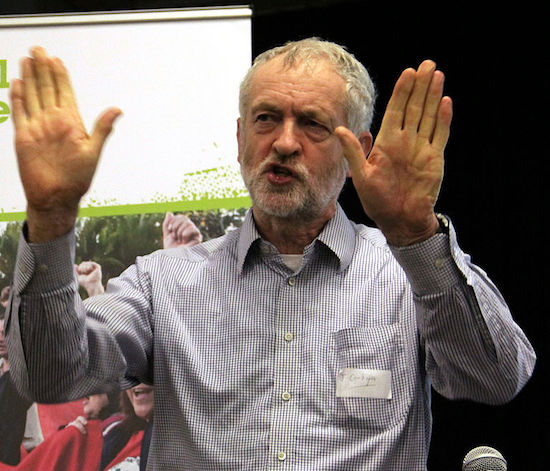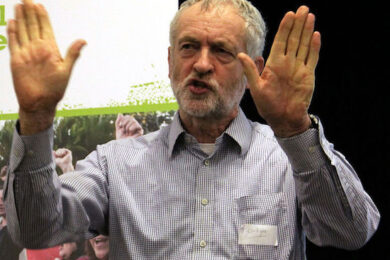Photograph courtesy of Global Justice Now
If he’d wanted to be any more patronising, David Cameron would have had to have crossed the floor of the House of Commons and patted the silly old man on the head. This was how Jeremy Corbyn’s first Prime Minister’s Questions session as leader of the opposition went down. Despite his skinny majority, it’s so incredibly easy being David Cameron at the moment. He can be the soul of reason and the epitome of civility at PMQs. He can delegate the brutality. In fact, he doesn’t even have to delegate it – these days, it activates automatically.
Even his most devoted supporters might concede that since being elected Labour party leader, Jeremy Corbyn hasn’t always helped himself. He’s struggled to appoint a shadow cabinet that is able to maintain any kind of discipline and he’s communicated in a series of startled yet recalcitrant grunts and scowls – the caveman tongue of chippy Old Labour – as if the idea of reaching out to voters beyond the fulminating #jezwecan Twittersphere would represent some sort of crassly decadent betrayal of principle. In short, he’s behaved exactly as you’d expect a hard-left serial rebel who’s somehow found himself leading the Labour party at the age of 66 to behave. For some people, that’s the attraction. But in the medium and long term, it’s not going to be enough.
But still, you surely don’t have to be a hardline Corbynista – in fact, you could probably be a principled, libertarian Tory or a Westminster-hating UKIP supporter – to find the ferocity and unanimity of the attacks on Corbyn startling and just slightly terrifying. And they’re not just coming from the usual suspects either. The Guardian and New Statesman have drip-fed scepticism. And the BBC has been outright hostile. And so, most notably of all, have been members of his own party. It’s been deeply unsettling – like watching a nationwide character-assassination machine grinding into gear, crushing all divergent opinions, humiliating and possibly destroying a democratically elected party leader in the name of the parliamentary status quo.
There’s plenty to choose from but the furore over Corbyn’s failure to sing the national anthem at the Battle of Britain commemoration has been the most pointed so far. Didn’t people know that Jeremy Corbyn was a republican? Surely they did? The cameras were trained on him for a reason. And had the Corbyn lips as much as twitched during our national dirge, you can bet he’d have been damned as a hypocrite by many of the same people who yesterday queued up to excoriate him. In any case, republicans make up between 15 and 25 per cent of the British population so is this stance really so outlandish? Inevitably, The Sun, The Daily Mail and The Telegraph have got themselves hot under the collar about this. But they’re far from alone. "Even if you can’t sing, you should stand there mouthing the words," said Jenni Russell on Newsnight. Somewhere in the ether, Josef Stalin nodded in approval.
Like many of Corbyn’s critics, Russell has often been sympathetic to centrist Labour positions in the recent past. And in a way, this is the most alarming aspect of all this. Also sticking the boot in were Labour MPs such as Owen Smith and Kate Green. It reinforces the sense that while for Corbyn’s supporters, his principles are his most attractive attribute, for his opponents – and particularly, his opponents within his own party – they’re his achilles heel. We all knew this would happen and in fact, the inevitability of the press assault on Corbyn was repeatedly cited as a reason for not voting for Corbyn. And this is possibly the scariest aspect of this whole farce. Long-term Labour supporters want their leader to abandon his principles, but ideally, they suspect it might be easier if he’d had none in the first place. That’s how powerful our bullying, overbearing media has become. The Labour party are afraid of their own shadows – to the extent that when one of their own number breaks cover, they join in with attempts to destroy him. That’s how discombobulated people on the mainstream left now are. That’s the extent to which progressives have given up on having leaders who will say and do what they really think.
This shambles has even taken on a global dimension. Democratic presidential hopeful Bernie Sanders has been the subject of what he’s described as a "vicious attack" for his support for Corbyn. And Russian state representatives in the UK have raised their official eyebrows at the tone of debate, wondering quizzically about UK media reaction had Vladimir Putin called an opposition party leader a threat to national security?
Oh well. The Russians might have noticed, but no one in the UK seems that bothered. Jeremy Corbyn is being systematically brutalised, this week for the crime of failing to hide his disagreement with the concept of hereditary privilege, but in a wider sense, for not accepting the political and economic consensus as a whole. Without wishing to get too Godwin’s law, this may be how modern one-party states begin – not through physical coercion but through the fear of humiliation; through constant, vicious and unreasoning criticism from an unaccountable media who still haven’t forgiven the Labour party for what happened in 2011. So, this is the kind of treatment you can expect when you object to systematic lawbreaking at a media organisation. Even systematic lawbreaking that culminates in the hacking of the phone of a murdered child. Even, perish the thought, systematic lawbreaking which involved the hacking of the phones of the beloved royal family whose theme tune, we’re told, has been so grievously disrespected. And more importantly from the Conservative party’s point of view, this is what you get when you don’t particularly object to those things. You’re gifted a self-perpetuating political equilibrium that rewards your craven cowardice.
Given that it was so central to Wednesday’s argument, the Battle of Britain is worth considering here. What were those airmen fighting for back then? Democracy? The kind of democracy where a country can be governed by a party that won 24.3 percent of the votes? Where two parties (UKIP and the Greens) can achieve five million votes between them and be rewarded with two seats? Where a candidate can achieve one of the most overwhelming mandates of any party leader in British history and discover that it makes him a mere object of derision among enemies and ‘friends’ alike. The media and the cross-party Westminster mainstream regularly wring their hands about the British population’s lack of faith in politics. They should ponder the last few months – and, in particular, the last few days – and wince with embarrassment. God knows there’s plenty wrong with Jeremy Corbyn. But he’s really showing us something about ourselves here. Britain is many things at the moment. But a healthy and functional democracy isn’t one of them.



